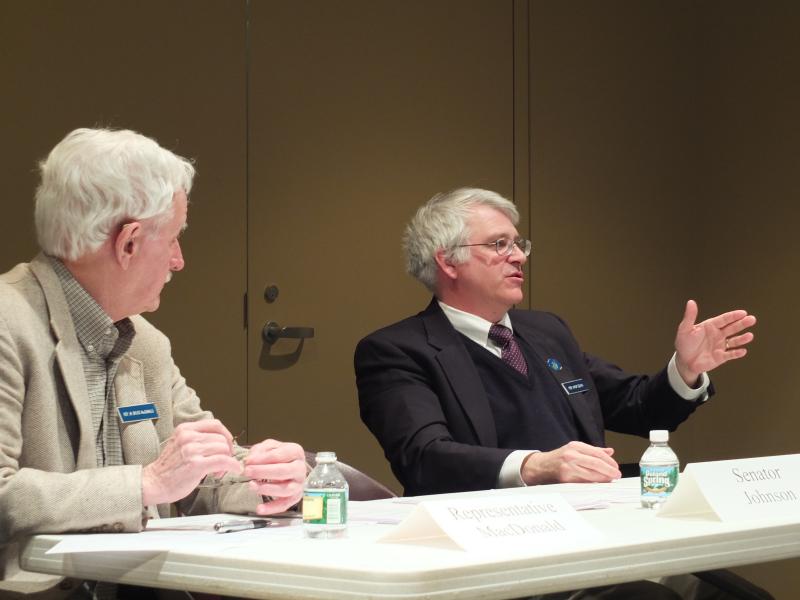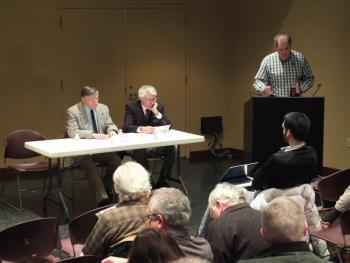Residents ponder impacts of LePage's budget

More than 40 Lincoln County residents debated and discussed proposed cuts in Gov. Paul LePage's biennial state budget, and the potential impacts, during a forum in Damariscotta February 15.
The Friday listening session, as one state representative described the meeting, was one among many others scheduled in the Midcoast designed to get feedback from the public about the cuts the governor has proposed as well as potential solutions to losses in federal funding and a shrinking of the state's economy.
While the forum was led by Lincoln County's Democratic representatives, concerns about the proposals in the governor's biennial budget came from both sides of the political aisle. Sen. Chris Johnson (District 20, Somerville), state representatives Mick Devin (District 51, Newcastle) and Bruce MacDonald (District 61, Boothbay) formed a panel at the meeting, which was hosted by the town of Damariscotta and town manager Matt Lutkus. Selectmen and residents from several area towns, including Edgecomb, Whitefield, Boothbay, Newcastle, Bremen and Waldoboro joined the conversation.
Damariscotta is looking at a potential loss of $203,000 in state revenues, Lutkus said. The town has a $14.37 tax rate and approximately 63 percent of property tax revenue goes to pay for education. “Two hundred thousand dollars needs to come from somewhere,” Lutkus said. “I think our selectmen's initial reaction was, ‘It’s likely not coming from a tax increase.’
“Immediately you're looking at an impact on our largest departments,” he said. These are the police, public works and solid waste departments. According to Lutkus, the loss in state revenue, excluding the impact of the county budget, amounts to roughly nine percent of the current year's $2.2 million annual municipal budget.
Lutkus and town staff are working through a budget-cutting exercise in anticipation of the state cuts, and he indicated they are having a difficult time finding solutions.
Several residents and local town officials reacted similarly, expressing frustration over the loss in state revenue sharing in the proposed budget.
“What continues to discourage me over the years is there is a perception that if you balance the budget in Augusta, then it's not going to hurt the taxpayer,” Bremen Board of Selectmen chairman Wendy Pieh, a Democrat, said. “I really appreciate the effort that's been happening to save revenue sharing.”
Damariscotta selectman Josh Pinkham, a Republican, said he was concerned about the loss of state revenue sharing funds. He asked Johnson and the others how they would work to keep that revenue in towns.
“My take is that it's a non-starter,” MacDonald said. “[The revenue sharing provision has] got to go. It has a terribly adverse impact on local budgets, obviously, and schools in particular.” He added that their plan is to find a different way to make those savings or increase revenue.
Much of the evening's discussion focused on this core issue. Several people offered alternatives to the state budget problem, such as: having the legislator take a second look at charter and virtual schools; study the impacts of an increase in sales tax; or re-examine a meals and lodging tax. Edgecomb resident Margaret Schuler asked why the state could not have funded a new bridge in Wiscasset, since it would generate jobs and attract tourists to the area.
The representatives are visiting towns in their districts in the coming days and weeks to further discuss the governor's proposed biennial budget, as well as the challenges towns face in a fiscally strained economy. The Appropriations Committee will start reviewing the biennial budget proposal later this month, according to Johnson.
Legislators have until April 1 to meet the 90-day deadline to come up with a budget, which the governor could veto. All three representatives agreed they did not believe an agreement will be made by April 1, so the legislature will have to come up with an emergency budget. This would require a two-thirds vote and could surpass the governor's veto.
“I think we've got to go for a budget that is inclusive enough to get a two-thirds vote,” MacDonald said. “And that means nobody's going to get everything they want.” Johnson added that there will be a lot of collaboration to reach that goal.


























